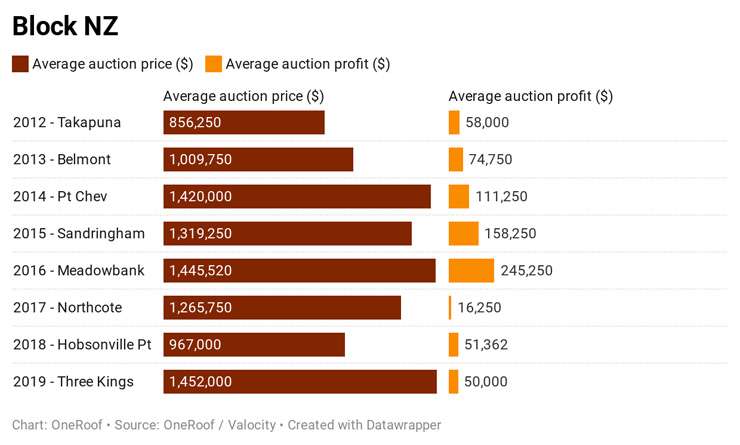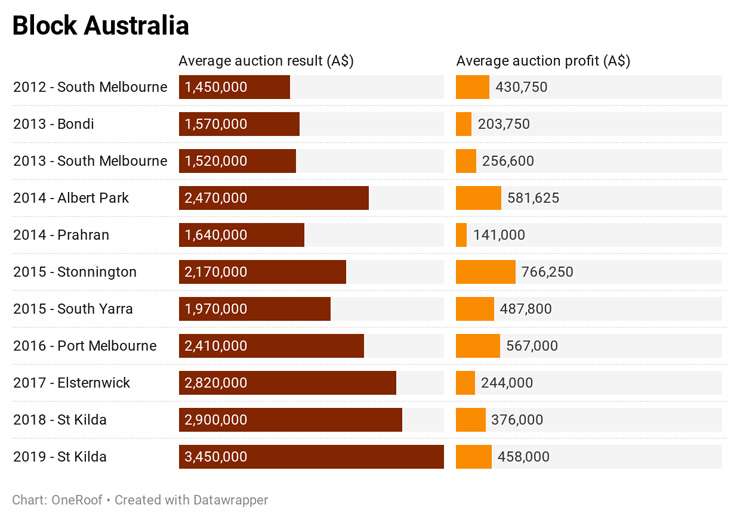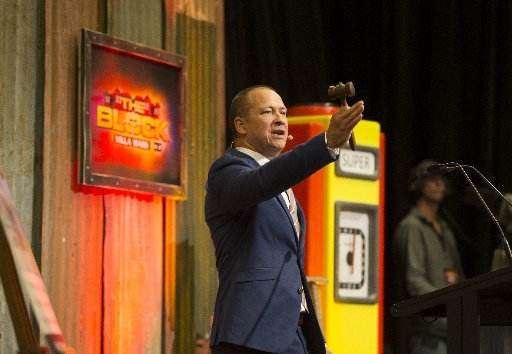This year the Block NZ is expected to return to Auckland's Pt Chevalier, almost six years after the show and the suburb made stars of renovators Alex and Corban Walls.
With filming on hold due to Covid-19, OneRoof decided to look back over previous seasons to see just how crazy Kiwis are about the homes the contestants do-up and take to auction.
There's no doubting that the show has been popular with audiences but the houses themselves have rarely set the market on fire.
OneRoof looked at the average profit for each of the show's eight seasons since it started and compared the figures to the profits enjoyed on equally popular Block Australia.
Start your property search
The profit made on each of the auctions represents how much bidders went above the reserve.
And while the reserve price, both in New Zealand and Australia, doesn't necessarily correlate to market prices it does generally show what contestants, agents and auctioneers thought was a reasonable price for the renovated properties.
OneRoof and its data partner Valocity found that the average auction profit for Block NZ contestants since 2012 was NZ$95,639 while the average auction profit for Block Australia contestants over the same period was A$410,252 (NZ$440,788) - a gap of almost NZ$350,000 or 128 percent.


This is quite a difference, even more so when you consider that property values have risen more in Auckland in the last 10 years than they have in Melbourne, where almost all of the Block Australia's seasons have been filmed.
OneRoof editor Owen Vaughan says: "This suggests that Kiwi buyers, unlike those Australia, have resisted paying over the odds for Block homes. Prices for Block NZ homes have generally been in line with the market of the suburb, showing Kiwis are a more cautious, sensible lot when it comes to home ownership."
OneRoof and Valocity also looked at how many Block NZ homes had been flipped since selling on the show. James Wilson, director of valuation at Valocity, says few have, which suggests buyers are happy with their purchases.
“The first transaction is not typically double market value; they do tend to be in line with the market. Despite the hype, it does show those purchasers are still very much going back to the fundamentals – why are they buying the home, what is the home, does it stack up for me as an investment or as a property for me to live in.
“We’re not seeing as much as you see overseas where property will transact well in excess of market value purely because it’s a Block home – we’ve never really seen that in New Zealand.
“I think it indicates that people have bought a high specification home to live in and I think they probably enjoy living in them.”
Wilson says there has been some speculation over the seasons the homes sell for novelty value and might not be worth the prices they have fetched, but the data shows that doesn’t hold true.

An auction is called for one of the homes in season four The Block NZ. Photo / New Zealand Herald
“The homes or townhouses that are being lived in haven’t sold more than other properties. In fact, there's only one instance where all the houses from a particular season have been resold, and that was because the buyer wanted the land not the houses themselves."
The houses that featured in season one of the Block, in the Auckland North Shore suburb of Takapuna, sold under the hammer on the show in 2012 for an average $856,000, $100,000 below the suburb's median sale price at the time but in line with the suburb's median value.
The houses were bought three years later by a developer, who removed them in order to build an apartment block. They fetched between $1.62 million and $1.95 million - well above Takapuna's median value in 2015. Wilson says: “The sales of those houses relate to being bought as a development rather than being sold on the open market. it totally changed their value as a result."
Another notable resale, Vaughan says, is a Block house from season three of the show. The house, in the central Auckland suburb Pt Chev, sold under the hammer in 2014 for $1.472 million, but was then resold in 2018 for $1.88 million - good capital growth but still not out of line with the suburb.
“It doesn’t look as if it sold at a great profit because it was a Block house, it just seems that suburb in that four year period did pretty well for itself – it grew quite significantly in terms of equity there,” Vaughan says.
Wilson adds Block homes as a whole have not reached staggering prices when compared to other sales in the suburb, and taking into account that the homes are high-spec and include furniture and other items.












































































